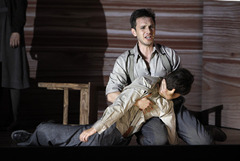| Opera Reviews | 17 May 2024 |
Raw emotions in this superb David et Jonathasby Catriona Graham |
|
| Charpentier: David et Jonathas Opera North Edinburgh International Festival August 2012 |
|
|
The production is superb, the set technically accomplished, the singing immaculate. However, it is not a production for the uninitiated - the narrative is disjointed, partly because of the work's genesis, with each act alternating with an act of a spoken Latin work, and partly because of the staging. Filling the proscenium with an arrangement of blackout curtains which allows rooms of different shapes and sizes to be revealed is effective but disrupts the storytelling a bit. It is worth the effort on the audience's part, as the shape-shifting rooms convey a nightmarish quality to Saul's consultation with the Witch (Dominique Visse) and other scenes. All the rooms have walls of light coloured knotty wood in horizontal planks. The only furniture is solid wooden tables and chairs. Gideon Davey's costumes, in dullest muted browns, greens, greys and blues, has a monochrome effect, the only brightness being the dull red of the fezzes. The period is uncertain, but could be the late Forties Arab-Israeli war. In the orchestra, the recorders blend so well with the voice of high tenor Paul Charbonneau (David) that, at times, his words seem to emerge from the composite sound. Here is passion and sincerity and he manages to convey a fastidious integrity. The love between him and Jonathas (Ana Quintans in Harry Potter glasses and short trousers) is all the more intense because barely expressed. Quintans' voice is delicious, light and airy and balances with Charbonneau. Her death scene is restrained and touching, David's grief intense. The odd move is too feminine for a gauche, adolescent boy, but otherwise, her demeanour catches the love-come-hero-worship which her character feels for his childhood friend. Krešimir Špicer as Joabel, the leader of the Philistine army, is generally disgruntled because jealous of David and, as a result, quite devious. His King, Achis, is much more straightforward, and Frédéric Caton plays him well. Neal Davies has a great range of emotion to portray as Saül - terror as the rooms change shape around him, anger, grief at the death of his wife and Jonathas's mother, spite, revenge … - and he does so convincingly. The choral ensembles and lesser roles are sung beautifully, with excellent acting - finely judged between deference to the kings and a certain nervousness around the soldiers, while relaxed and cheerful when celebrating victory. The children playing the young David and Jonathas - Gabriel Di Giorgio and Stefano Sojae respectively - are convincing both in their own right and as younger versions of Charbonneau and Quintans. The sound the orchestra produces for conductor William Christie is clean and sparkling, yet brings out the variations in colour and timbre. Director Andreas Homoki and set designer Paul Zoller are to be congratulated for their ingenious setting - despite any reservations above. |
|
| Text ©
Catriona Graham Photo © P.Victor / artcomart |

 'Compared with the visceral passions of Wagner, Marc-Antoine Charpentier's
music seems dressed in twinset and pearls. However, it conveys just
as much raw emotion, especially performed by Les Arts Florissants, leading
exponents of baroque opera. And the emotion is certainly very raw in
places in David et Jonathas.
'Compared with the visceral passions of Wagner, Marc-Antoine Charpentier's
music seems dressed in twinset and pearls. However, it conveys just
as much raw emotion, especially performed by Les Arts Florissants, leading
exponents of baroque opera. And the emotion is certainly very raw in
places in David et Jonathas. 




